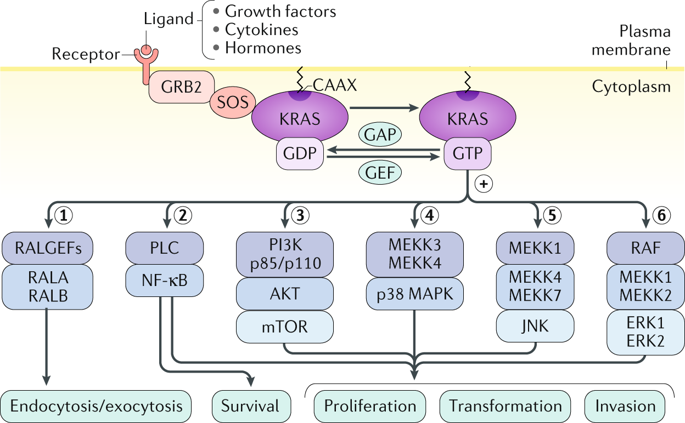当前位置:
X-MOL 学术
›
Nat. Rev. Gastroenterol. Hepatol.
›
论文详情
Our official English website, www.x-mol.net, welcomes your feedback! (Note: you will need to create a separate account there.)
Role of oncogenic KRAS in the diagnosis, prognosis and treatment of pancreatic cancer.
Nature Reviews Gastroenterology & Hepatology ( IF 65.1 ) Pub Date : 2020-01-31 , DOI: 10.1038/s41575-019-0245-4 Louis Buscail 1, 2 , Barbara Bournet 1, 2 , Pierre Cordelier 2
Nature Reviews Gastroenterology & Hepatology ( IF 65.1 ) Pub Date : 2020-01-31 , DOI: 10.1038/s41575-019-0245-4 Louis Buscail 1, 2 , Barbara Bournet 1, 2 , Pierre Cordelier 2
Affiliation

|
Pancreatic ductal adenocarcinoma (PDAC) is predicted to be the second most common cause of death within the next 10 years. The prognosis for this disease is poor despite diagnostic progress and new chemotherapeutic regimens. The oncogenic KRAS mutation is the major event in pancreatic cancer; it confers permanent activation of the KRAS protein, which acts as a molecular switch to activate various intracellular signalling pathways and transcription factors inducing cell proliferation, migration, transformation and survival. Several laboratory methods have been developed to detect KRAS mutations in biological samples, including digital droplet PCR (which displays high sensitivity). Clinical studies have revealed that a KRAS mutation assay in fine-needle aspiration material combined with cytopathology increases the sensitivity, accuracy and negative predictive value of cytopathology for a positive diagnosis of pancreatic cancer. In addition, the presence of KRAS mutations in serum and plasma (liquid biopsies) correlates with a worse prognosis. The presence of mutated KRAS can also have therapeutic implications, whether at the gene level per se, during its post-translational maturation, interaction with nucleotides and after activation of the various oncogenic signals. Further pharmacokinetic and toxicological studies on new molecules are required, especially small synthetic molecules, before they can be used in the therapeutic arsenal for pancreatic ductal adenocarcinoma.
中文翻译:

致癌性KRAS在胰腺癌的诊断,预后和治疗中的作用。
胰腺导管腺癌(PDAC)预计将在未来10年内成为第二大最常见的死亡原因。尽管有了诊断进展和新的化疗方案,该病的预后仍然很差。致癌性KRAS突变是胰腺癌的主要事件。它赋予KRAS蛋白永久激活作用,KRAS蛋白作为分子开关激活多种细胞内信号传导途径和转录因子,诱导细胞增殖,迁移,转化和存活。已经开发了几种实验室方法来检测生物样品中的KRAS突变,包括数字液滴PCR(显示高灵敏度)。临床研究表明,细针抽吸材料中的KRAS突变检测结合细胞病理学可以提高敏感性,细胞病理学对胰腺癌的阳性诊断的准确性和阴性预测价值。此外,血清和血浆(液体活检)中存在KRAS突变与预后差有关。无论是在基因水平本身,在翻译后成熟期间,与核苷酸相互作用以及在激活各种致癌信号之后,突变的KRAS的存在也可能具有治疗意义。在将新分子用于胰腺导管腺癌的治疗武库之前,需要对新分子,尤其是小的合成分子进行进一步的药代动力学和毒理学研究。无论是在基因水平本身,在翻译后成熟期间,与核苷酸相互作用以及在激活各种致癌信号之后,突变的KRAS的存在也可能具有治疗意义。在将新分子用于胰腺导管腺癌的治疗武库之前,需要对新分子,尤其是小的合成分子进行进一步的药代动力学和毒理学研究。无论是在基因水平本身,在翻译后成熟期间,与核苷酸相互作用以及在激活各种致癌信号之后,突变的KRAS的存在也可能具有治疗意义。在将新分子用于胰腺导管腺癌的治疗武库之前,需要对新分子,尤其是小的合成分子进行进一步的药代动力学和毒理学研究。
更新日期:2020-01-31
中文翻译:

致癌性KRAS在胰腺癌的诊断,预后和治疗中的作用。
胰腺导管腺癌(PDAC)预计将在未来10年内成为第二大最常见的死亡原因。尽管有了诊断进展和新的化疗方案,该病的预后仍然很差。致癌性KRAS突变是胰腺癌的主要事件。它赋予KRAS蛋白永久激活作用,KRAS蛋白作为分子开关激活多种细胞内信号传导途径和转录因子,诱导细胞增殖,迁移,转化和存活。已经开发了几种实验室方法来检测生物样品中的KRAS突变,包括数字液滴PCR(显示高灵敏度)。临床研究表明,细针抽吸材料中的KRAS突变检测结合细胞病理学可以提高敏感性,细胞病理学对胰腺癌的阳性诊断的准确性和阴性预测价值。此外,血清和血浆(液体活检)中存在KRAS突变与预后差有关。无论是在基因水平本身,在翻译后成熟期间,与核苷酸相互作用以及在激活各种致癌信号之后,突变的KRAS的存在也可能具有治疗意义。在将新分子用于胰腺导管腺癌的治疗武库之前,需要对新分子,尤其是小的合成分子进行进一步的药代动力学和毒理学研究。无论是在基因水平本身,在翻译后成熟期间,与核苷酸相互作用以及在激活各种致癌信号之后,突变的KRAS的存在也可能具有治疗意义。在将新分子用于胰腺导管腺癌的治疗武库之前,需要对新分子,尤其是小的合成分子进行进一步的药代动力学和毒理学研究。无论是在基因水平本身,在翻译后成熟期间,与核苷酸相互作用以及在激活各种致癌信号之后,突变的KRAS的存在也可能具有治疗意义。在将新分子用于胰腺导管腺癌的治疗武库之前,需要对新分子,尤其是小的合成分子进行进一步的药代动力学和毒理学研究。



























 京公网安备 11010802027423号
京公网安备 11010802027423号